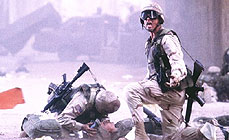|
|
|
|
Black
Hawk Down
|
 |
|
It has been many years – twenty, in fact – since I have really liked a Ridley Scott film. White Squall (1996) and G.I. Jane (1997) marked the nadir of his career with their confused values and overwrought affectations of style. Black Hawk Down, by contrast, shows Scott more firmly in control of his material. One admires it from a distance, marvelling at its logistics, respecting its consistency of tone, appreciating the ways in which – for the most part – it avoids easy clichés of individual heroism or redemption and instead stresses military teamwork (as well as a good acting ensemble that includes Josh Hartnett, Ewan McGregor and Eric Bana). But when it comes to the real meaning of its content, this film is appalling. Black Hawk Down, taken purely as a piece of filmmaking, is like a feature length expansion of the set-piece in Michael Mann's Heat (1995) in which criminals shoot their way, step by step, out of a hopelessly tight clinch in a crowded, city street. Except that here the premise comes not from a venerable movie genre but recent US history. We are in Somalia, 1993. An elite division of soldiers is sent in to capture a Somali leader. They never find him, but what they do discover is the might of their enemy en masse. Crash-landed in streets they barely know, the American soldiers are boxed in and mercilessly attacked. While their corpses are mutilated, Major General Garrison (Sam Shepard), in the safety of his control base, is tormented by the increasing impossibility of ever saving the day. In the 1950s, the best American war movies had a caustic, complex, ironic point of view on many things – on the relationship between soldiers and their commanders, between the army abroad and the government back home, and on the uneasy mirror image between 'us' and 'them' on the front line, no matter the ideological justification for opposing sides entering into pitch battle. Nowadays, at least judging by the likes of Saving Private Ryan (1998) or Black Hawk Down, there is no longer this probing, thoughtful viewpoint. There is no longer even the slightest vestige of political reason or doubt. There is only – as Bana gets to say in his big, climactic speech – "the guy next to you" in the middle of a crossfire. Scott might argue, as many contemporary war-movie-mongers do, that the aim is to convey the subjective, often bewildered experience of soldiers, the 'little men' whose efforts often go unsung back home. But this is an alibi which functions as a gross evasion of the responsibility that comes with telling a story about war. It is not enough to merely honour 'the moment' as lived by the individual soldier. There is a bigger picture, and we are not being allowed to even glimpse it. Black Hawk Down is not a blatantly jingoistic film. That is not its problem. After all, it portrays an incident which, in every sense, was a disaster for America – both in itself, as a tactical operation, and for its political consequences. But Scott slyly manages to have it both ways. He stresses (as many contemporary war films do) a sense of needless waste and horrific tragedy. But he also whips us up into a gung-ho frenzy as we fret for the remaining soldiers and their prospects for survival. The subtleties of a situation in which (as Alan Ryan comments in the January-February 2002 issue of Quadrant) the UN was "pulled into a war with a significant segment of the populace it was seeking to protect" are briskly ironed out by Scott and his writer Ken Nolan. The enemy is, once again, largely a faceless mob. In one near-hysterical moment, Scott pictures Somali citizens as ape-like scavengers. As in Kubrick's influential Vietnam movie Full Metal Jacket (1987), the most 'unnatural' horror is the revelation that women – and even children – might be pushed to take up arms in defence of their inexplicable, foreign creed. The few urbane Somali operatives that we actually hear speak for a second or two mercilessly mock the puritanism of Americans – now it's the dark villains, not the WASP heroes, who (in these politically correct days) get to smoke cigarettes with panache. For me, the self-cancelling forces at work in Black Hawk Down are summarised in Hans Zimmer's score. Doggedly switching style each time the dramatic mood changes, the music wheels through conventional brass-and-drums military music, modern techno, and a lush reminder of the same composer's elegiac chord-clusters for The Thin Red Line (1998) – often overlaying two or three of these modes at once, just for added effect. Scott's films may not be as bombastic or strident as Oliver Stone's, but they end up exactly the same way, collapsing in on themselves. MORE Scott: Blade Runner, Kingdom of Heaven, Thelma and Louise © Adrian Martin January 2002 |
![]()